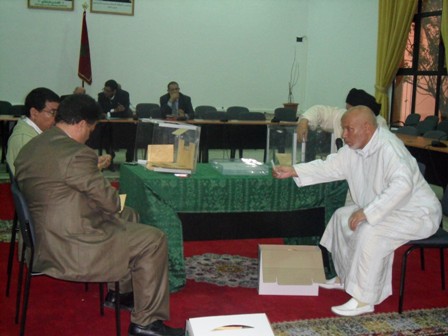LAAYOUNE: 76 APARTMENTS FOR RIGHTS HOLDERS CONCERNED BY IER’S SOCIAL INTEGRATION RECOMMENDATIONS
In line with the implementation of the Equity and reconciliation Commission’s social integration recommendations, CNDH Regional Human Rights Commission in Laayoune-Smara presided over the distribution of 76 apartments to rights holders concerned by IER’s social integration recommendations.
This operation was carried out in the presence of the Wali of the region of Laayoune-Boujdour-Sakia Lhamra and the governor and Pasha of Laayoune. Information on these housing units and how the distribution of these units was drawn by the members of the Council of Oulémas (religious scholars).
Following the Equity and Reconciliation Commission’s social integration recommendations and in implementation of a memorandum issued by the Prime Minister dated April 1, 2010 and the points upon which the central committee in charge of social integration agreed, relative to the creation of local committees in the Moroccan provinces and prefectures, chaired by walis and governors, local committees met to study cases submitted to each committee by the former Advisory Council on Human Rights. These cases were different in terms of number, social conditions and qualifications. In addition to the Council, all sectors concerned by social integration were involved in these committees.
The central committee:
- follow-up of the works of local committees during this program;
- ratification of integration suggestions of the reports of local committees;
- treatment of complicated cases referred to the committee by local committees.
Local committees:
- examination of details and information mentioned in the files of the persons concerned;
- meeting beneficiaries individually to receive to their requests and suggestions;
- study of suggestions and requests submitted by the persons concerned;
- examination of all regional and local social integration possibilities, taking into consideration the qualifications and circumstances of the persons concerned and the outreach approach;
- treatment of each file and giving relevant suggestion to the central committee;
- referring complicated cases to the central committee.
The social integration recommendation of the Equity and Reconciliation Commission (IER) and the relevant recommendation of the committee that was entrusted with the follow up on the implementation of the IER’s recommendations aimed at several cases, to wit:
- cases of victims who didn’t have social status and who are unable to practice any job and cannot integrate, due to their age or health conditions;
- cases of victims who used to work for private big institutions and lost their jobs. The IER recommend the settlement of their conditions vis-à-vis the institutions, if they were not already settled;
- cases of victims who carried out their studies and obtained their diplomas during detention, and couldn’t integrate after release;
- cases of victims who were students and could not carry out their studies due to detention, and couldn’t integrate after release;
- cases of victims’ minor children, who couldn’t carry out their studies and integrate, due to human rights violations.






















